New Delhi, July 22 (FN Bureau) Despite being one of the fastest-growing economies in the World, India’s annual per capita carbon emission is only about one-third of the global average, said Economic Survey 2023-24 tabled in Parliament by Finance Minister Nirmala Sitharaman on Monday. Delving further into India’s achievements on addressing climate change, the Survey quoted a recent report by the International Finance Corporation, which highlighted that India is the only G20 nation in line with 2-degree centigrade warming. “The hallmark of India’s growth strategy is to manage the impact of climate change and at the same time give desired focus to developmental prioritise” the survey mentioned. Mentioning the significant progress made by India on Climate Action, the survey said, “India achieved most targets of the first NDC well in advance”.
“The nation achieved 40 percent cumulative electrical power installed capacity from non-fossil fuel-based energy sources in 2021 and reduced the emission intensity of India’s GDP from 2005 levels by 33 percent in 2019” it said. The survey states that non-fossil sources in the installed electricity generation capacity has reached 45.4 percent up from 32 percent in April 2014. “India is also on track to make an additional carbon sink of 2.5 to 3.0 billion tonnes through tree and forest cover by 2030, with a carbon sink of 1.97 billion tonnes of CO2 equivalent having already been created from 2005 to 2019” it said. Highlighting various challenges to India’s development of a low-carbon path, the Economic Survey mentioned that expanding renewable energy and clean fuels will increase demand for land and water.
Recognising the importance of energy efficiency measures in accelerating clean energy transitions while supporting energy security, the Survey highlighted several initiatives taken by the Government to improve energy efficiency. The survey extensively talks about India leading several international initiatives towards climate change mitigation and building resilience. These include, the International Solar Alliance (ISA), One Sun, One World, One Grid (OSOWOG), the Coalition for Disaster Resilient Infrastructure (CDRI), the Infrastructure for Resilient Island States’ (IRIS) and the Leadership Group for Industry Transition (LeadIT).

